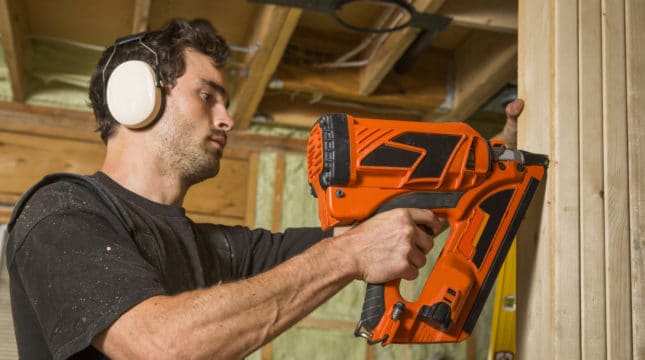Mississippi
License required: Yes
In Mississippi, a carpenter is considered a remodeler and requires a Residential Remodeling License to do any work that is considered improvements to an existing structure when the cost of the improvements is more than $10,000. The Mississippi State Board of Contractors awards the license.
You will need to pass a trade exam, as well as a business and law exam. You’ll need to show proof of general liability insurance.
Missouri
License required: No
Carpenters in Missouri do not need a state license to work. However, there may be local Missouri carpenter license requirements, and you need to check these before you begin any projects.
Montana
License required: No
A carpenter is considered a construction contractor in Montana and is defined as anyone who “adds or takes away from a structure, project, development or improvement attached to real estate.” There are no carpenter license requirements, but if you have employees, you must register with the Department of Labor and Industry. You must have valid insurance.
Nebraska
License required: No
You don’t need a state license to work as a carpenter in Nebraska; however, as a subcontractor who may perform construction, alterations, renovations, additions, repairs or installations, you will need to register with the Nebraska Department of Labor.
Nevada
License required: Yes
Carpenters must hold a state specialty contractor License to work in Nevada. Carpentry, maintenance and minor repairs is a C-3 subclassification which includes carpentry and repairs (C-3a), finish carpentry (C-3b), insulation and weather stripping (C-3c), overhead doors (C-3d), and drywall (C-3e). There are exceptions when the work to the property is worth less than $1,000.
You’ll need proof of four years of experience, but up to three years of education at an accredited college can satisfy years of experience. You must show proof of workers’ compensation insurance and will need to show proof of a bond. To meet all carpenter license requirements, you must pass the trade exam, as well as the business and law exam.
New Hampshire
License required: No
You won’t need a state license to work in New Hampshire as a carpenter. Check local regulations and carpenter license requirements before you begin work.
New Jersey
License required: No
Carpenters in New Jersey are classified as home improvement contractors. They remodel, alter, paint, repair, renovate, restore, move, demolish or modernize a structure. This includes constructing, improving or repairing patios, fences, porches, windows, doors, cabinets, and more.
All home improvement contractors must register with the New Jersey Division of Consumer Affairs. There is no state license but there may be local licensing requirements.
New Mexico
License required: Yes
As a carpenter, you may need a state license to work in New Mexico. You’ll need to request a classification. In this request, contractors will define their job as thoroughly as possible, the industry they expect to work in and whether they intend to be the prime contractor. Carpenters may be classified as a GB-2 Residential or GB-98 General Building contractor.
You’ll need to show proof of experience (two to four years, depending on the classification) and pass a trade exam, as well as a business and law exam.
New York
License required: No
New York state does not require carpenters to hold a state license in order to work. However, there are local carpenter license requirements, and you must check these with the local government before you begin work.
North Carolina
License required: Yes
As a carpenter, you’ll fall under the label of general contractor or specialty contractor. North Carolina requires a state license if your work totals $30,000 or more. A residential contractor does work in the construction of residential units. A specialty contractor includes interior construction, flooring and finishing, window and door installation, cabinets, and more.
Requirements include meeting the minimum financial requirement and completing a license exam based on the desired classification of license.
North Dakota
Specific carpenter license: No
As a carpenter, you’ll be considered a contractor in North Dakota and will require a state license for any work worth more than $4,000. Licenses are based on the scope of the work you plan to do and are awarded by the Secretary of State.
You’ll need to show proof of general liability and workers’ compensation insurance.
Ohio
License required: No
Carpenters do not need a state license to work in Ohio. However, you must check local carpenter license requirements before you begin work.
Oklahoma
License required: No
You won’t need a state license to work as a carpenter in Oklahoma. However, be aware that there may be requirements on the local level, and you should check these before you begin any work.
Oregon
License required: Yes
As a carpenter, you’ll need a construction contractor license from the Oregon Construction Contractors Board before you can work in the state. Carpentry is listed as a profession that involves real estate improvements and requires a license. You can submit a license application for a residential license, commercial license or residential and commercial dual license.
You’ll need to provide proof of business insurance in Oregon, including general liability and workers’ compensation insurance. You also need to undertake pre-license training and pass a test.
Pennsylvania
License required: No
There is no licensing requirement for carpenters in Pennsylvania; however, any contractors who do at least $5,000 worth of home improvement work per year must register with the Attorney General’s Office.
Rhode Island
License required: No
There is no state licensing requirement for carpenters in Rhode Island. However, as someone who may do commercial construction, home construction, alterations, remodeling or repairs to properties, you must register with the Contractors’ Registration and Licensing Board.
You must complete five hours of pre-education courses and must show proof of liability insurance.
South Carolina
License required: No
The South Carolina Residential Builders Commission does not require a carpenter to be licensed by the state; however, you must register with the South Carolina Department of Labor, Licensing and Regulation as a carpenter.
South Dakota
License required: No
You won’t need a state license to work as a carpenter in South Dakota; however, there are carpenter license requirements on the local level, so make sure to check these before you begin to work.
Tennessee
License required: Yes
If you’re going to work as a prime contractor on projects valuing $25,000+, you must be licensed in Tennessee by the Department of Commerce & Insurance. Depending on the projects you work on, there are six different licenses available.
To apply, you’ll need proof of insurance and must pass a trade exam, as well as a business and law exam.
If you work on remodeling projects between $3,000 and $25,000, you can apply for a “home improvement contractor” license. The following counties require this license for this scope of work: Bradley, Davidson, Hamilton, Haywood, Knox, Marion, Robertson, Rutherford, and Shelby counties.
Texas
License required: No
As a carpenter, you won’t need a state license to work in Texas; however, there may be local Texas carpenter license requirements so make sure to check with your city or county before you begin work.
Utah
License required: Yes
As a carpenter in Utah, you’ll fall under the trade classification S220 Carpentry Contractor and will need a state license to work. The Utah Division of Occupational and Professional Licensing awards the contractor license.
You’ll need to show two years of experience in the past ten years, as well as proof of business insurance in Utah. You will be exempt from needing a license if the work you do is valued at less than $3,000.
Vermont
License required: No
You do not need a state license to work as a carpenter in Vermont; however, you must check the requirements with local governments before you begin work.
Virginia
License required: Yes
As a carpenter in Virginia, you’ll fall under the Residential Building Contractor classification, including Home Improvement Contracting. There are three classes of licenses — A, B or C — depending on the value of the projects you plan to work on.
- Class A licenses are restricted to individual projects worth up to $10,000 and up to $150,000 per year. You must show two years of experience.
- Class B licenses are limited to individual projects of up to $120,000 and up to $750,000 per year. You must show three years of experience.
- Class C licenses are unlimited. You must show five years of experience.
You must complete a pre-license education course approved by the Board of Contractors and pass an exam.
Washington
License required: No
Carpenters are considered specialty contractors in Washington, falling either under “cabinets, millwork and finish carpentry,” or “framing and rough carpentry.” No state carpenter license requirements exist, but specialty contractors must register with the Washington State Department of Labor & Industries.
You’ll need to show proof of a $6,000 surety bond and general liability insurance.
West Virginia
License required: Yes
As a carpenter, you’ll need to hold a state license to work in West Virginia on any projects worth more than $2,500. Finish carpentry (058) is considered an untested specialty, requiring only a business and law exam. The WV Division of Labor awards the license.
Wisconsin
License required: Yes
As a carpenter, you’ll need a Dwelling Contractor Qualifier license to work in Wisconsin. This covers construction on residential, commercial or public works projects, including alterations and improvements, worth more than $1,000.
You must complete an approved 12-hour pre-licensure course and pass a test. You must show proof of financial responsibility and proof of business insurance in Wisconsin, specifically general liability insurance and workers’ compensation insurance. The Department of Safety and Professional Services awards the license.
Wyoming
License required: No
Carpenters do not need a state license to work in Wyoming; however, there may be local carpenter license requirements, so check these before you begin work. This information is provided as a service.






